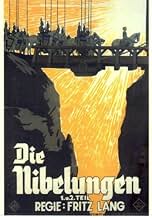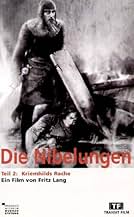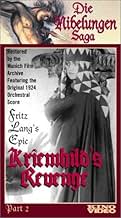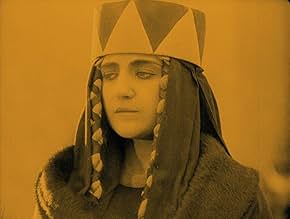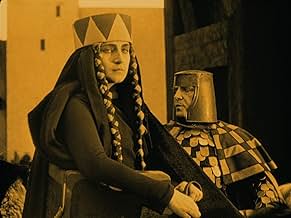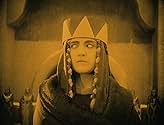Les Nibelungen : La Vengeance de Kriemhild
Original title: Die Nibelungen: Kriemhilds Rache
IMDb RATING
7.9/10
5.4K
YOUR RATING
Princess Kriemhild vows to avenge her husband's murder but must overcome her brothers who swore allegiance to Hagen. She marries Etzel, King of the Huns, and persuades his army to attack Hag... Read allPrincess Kriemhild vows to avenge her husband's murder but must overcome her brothers who swore allegiance to Hagen. She marries Etzel, King of the Huns, and persuades his army to attack Hagen, but she loses more than she bargained for.Princess Kriemhild vows to avenge her husband's murder but must overcome her brothers who swore allegiance to Hagen. She marries Etzel, King of the Huns, and persuades his army to attack Hagen, but she loses more than she bargained for.
- Awards
- 1 nomination total
Yuri Yurovsky
- The Priest
- (as Georg Jurowski)
- Director
- Writer
- All cast & crew
- Production, box office & more at IMDbPro
Featured reviews
Die Nibelungen : Kriemhild's Revenge (1924) :-
Brief Review -
Bow down to the First Greatest Dual Epic of the World Cinema, bow down to Master Fritz Lang. Die Nibelungen: Kriemhild's Revenge follows the story of Kriemhild's insane and uncontrollable Revenge after Sigfried's murder and believe me there's no stopping to the visual extravaganza from the beginning to the end. Unlike its predecessor, this one wastes no time in introduction. It gets to the point right on the beginning note from where you don't get a moment to think about anything else for 2 hours. Fritz Lang had saved a lot of content for this one but the biggest achievement of this film is catching the burning tone of insane self destruction within an acceptable revenge. Revenge stories are nothing new but a fine tit for tat, blood for blood in typical forms but Fritz Lang fetched unethical terms and inappropriate outburst to discover a salvation in realistic fantasy world. Kriemhild's Revenge could possibly be a contender for One Of the Greatest Epic Adventure ever made, not because of its grandeur but because of humanly possible techniques of self-blessedness within cinematic boundaries. Even if you exclude its artistic values, you still have a great explosive money making entertainer in hand and that's what the greatness of this film lies. From performances to screenplay to spectacular visuals to unlimited production designing to the impeccable storytelling, Kriemhild's Revenge tops the list in every aspect. What LOTR and Bahubali achieved in 21st Century, Kriemhild's Revenge did it in 1920s only and that too without the help of advanced technology. Words might fall short to explain the glory of this Fritz Lang Classic in today's time but all i can do is bow down to the Legend and his Legendary Magnus Opus. The Greatest work in Larger Than Life Cinema of its time, that's it!
RATING - 8/10*
By - #samthebestest
Bow down to the First Greatest Dual Epic of the World Cinema, bow down to Master Fritz Lang. Die Nibelungen: Kriemhild's Revenge follows the story of Kriemhild's insane and uncontrollable Revenge after Sigfried's murder and believe me there's no stopping to the visual extravaganza from the beginning to the end. Unlike its predecessor, this one wastes no time in introduction. It gets to the point right on the beginning note from where you don't get a moment to think about anything else for 2 hours. Fritz Lang had saved a lot of content for this one but the biggest achievement of this film is catching the burning tone of insane self destruction within an acceptable revenge. Revenge stories are nothing new but a fine tit for tat, blood for blood in typical forms but Fritz Lang fetched unethical terms and inappropriate outburst to discover a salvation in realistic fantasy world. Kriemhild's Revenge could possibly be a contender for One Of the Greatest Epic Adventure ever made, not because of its grandeur but because of humanly possible techniques of self-blessedness within cinematic boundaries. Even if you exclude its artistic values, you still have a great explosive money making entertainer in hand and that's what the greatness of this film lies. From performances to screenplay to spectacular visuals to unlimited production designing to the impeccable storytelling, Kriemhild's Revenge tops the list in every aspect. What LOTR and Bahubali achieved in 21st Century, Kriemhild's Revenge did it in 1920s only and that too without the help of advanced technology. Words might fall short to explain the glory of this Fritz Lang Classic in today's time but all i can do is bow down to the Legend and his Legendary Magnus Opus. The Greatest work in Larger Than Life Cinema of its time, that's it!
RATING - 8/10*
By - #samthebestest
Like grand opera, this film and its predecessor, "Siegfried", are a little too slow in pace, but the visual treats are unforgettable. It is best to see the two films together, but the sequel is not as good, mainly because there is not very much story left. Most of the time it's just Kriemhild wandering around looking vengeful, but Margarethe Schoen does it so well! The performance of Rudolph Klein-Rogge as Attila the Hun is wildly energetic - he is magnificent. But you can't help thinking why don't they just kill Hagen Tronje and get on with life, especially after he murders the baby. Something to do with Teutonic loyalty apparently.
But who can forget the rabbit-warren Hun village, and all those grubby Huns running about. Of course the film is racist as the Teutons somehow survive against overwhelming numbers of Huns - no wonder Hitler liked this film. "Siegfried" was very fascist too, with the glorious Aryan impregnable and very gorgeous (thanks to Paul Richter). But "Kriemhild's Revenge" lacks the wonderful fantasy sequences of "Siegfried" like the dwarves kingdom and especially that superb dragon fight - but at least here Kriemhild herself gets some balls - she seemed so stupid in "Siegfried".
But who can forget the rabbit-warren Hun village, and all those grubby Huns running about. Of course the film is racist as the Teutons somehow survive against overwhelming numbers of Huns - no wonder Hitler liked this film. "Siegfried" was very fascist too, with the glorious Aryan impregnable and very gorgeous (thanks to Paul Richter). But "Kriemhild's Revenge" lacks the wonderful fantasy sequences of "Siegfried" like the dwarves kingdom and especially that superb dragon fight - but at least here Kriemhild herself gets some balls - she seemed so stupid in "Siegfried".
This second half of Fritz Lang's epic filming of the Nibelungen Saga has many of the same strengths as the first, with memorable characters and interesting, atmospheric settings. This part of the story continues with many of the same characters, but the story itself is of a much different nature. There is less complexity but more action, with the entire focus being on Kriemhild and her inflexible desire for revenge. This part of the story does not have such interesting relationships amongst the characters as did the first part, but instead provides first and foremost an unforgettable portrait of the obsessed Kriemhild.
She, Gunther, and Hagen are now thoroughly defined characters who have chosen where they stand, and so there is not the kind of dramatic uncertainty and tension that the first part held. Instead, there is a more straightforward battle of wills, but with an added wild card in the person of Attila, portrayed memorably and with great energy by Rudolf Klein-Rogge. Attila and the Huns are depicted in a way that most likely has little basis in history, but it is certainly interesting to see the bizarre fashion in which the Huns and their world are portrayed. As events unfold, the developments are not always fully plausible, but the stakes and the pressure on each side steadily rise, building to an intense climax.
What you remember most after the film is over is the remorseless, implacable Kriemhild. With her costume obscuring almost everything else, Margarete Schön portrays the depth of Kriemhild's emotions and determination using only her face and, especially, her eyes. It is about as memorable a portrait as you will find in cinema of the madness and destructive fury of revenge. While "Kriemhild's Revenge", as a whole, does not have the thematic depth of "Siegfried", it succeeds in establishing this central image in a manner not easily forgotten.
She, Gunther, and Hagen are now thoroughly defined characters who have chosen where they stand, and so there is not the kind of dramatic uncertainty and tension that the first part held. Instead, there is a more straightforward battle of wills, but with an added wild card in the person of Attila, portrayed memorably and with great energy by Rudolf Klein-Rogge. Attila and the Huns are depicted in a way that most likely has little basis in history, but it is certainly interesting to see the bizarre fashion in which the Huns and their world are portrayed. As events unfold, the developments are not always fully plausible, but the stakes and the pressure on each side steadily rise, building to an intense climax.
What you remember most after the film is over is the remorseless, implacable Kriemhild. With her costume obscuring almost everything else, Margarete Schön portrays the depth of Kriemhild's emotions and determination using only her face and, especially, her eyes. It is about as memorable a portrait as you will find in cinema of the madness and destructive fury of revenge. While "Kriemhild's Revenge", as a whole, does not have the thematic depth of "Siegfried", it succeeds in establishing this central image in a manner not easily forgotten.
Please see also my comment on Die Nibelungen part 1: Siegfried.
The second part of UFA studio's gargantuan production of the Nibelungen saga continues in the stylised, symphonic and emotionally detached manner of its predecessor. However, whereas part one was a passionless portrayal of individual acts of heroism, part two is a chaotic depiction of bloodletting on a grand scale.
As in part one, director Fritz Lang maintains a continuous dynamic rhythm, with the pace of the action and the complexity of the shot composition rising and falling smoothly as the tone of each scene demands. These pictures should only be watched with the note-perfect Gottfried Huppertz score, which fortunately is on the Kino DVD. Now, with this focus on mass action, Lang is presented with greater challenges in staging. The action sequences in his earliest features were often badly constructed, but now he simply makes them part of that rhythmic flow, with the level of activity on the screen swelling up like an orchestra.
But just as part one made us witness Siegfried's adventures matter-of-factly and without excitement, part two presents warfare as devastating tragedy. In both pictures, there is a deliberate lack of emotional connection with the characters. That's why Lang mostly keeps the camera outside of the action, never allowing us to feel as if we are there (and this is significant because involving the audience is normally a distinction of Lang's work). That's also why the performances are unnaturally theatrical, with the actors lurching around like constipated sleepwalkers.
Nevertheless, Kriemhild's revenge does constantly deal with emotions, and is in fact profoundly humanist. The one moment of naturalism is when Atilla holds his baby son for the first time, and Lang actually emphasises the tenderness of this scene by building up to it with the wild, frantic ride of the huns. The point is that Lang never manipulates us into taking sides, and in that respect this version has more in common with the original saga than the Wagner opera. The climactic slaughter is the very antithesis of a rousing battle scene. Why then did Hitler and co. get so teary-eyed over it, a fact which has unfairly tarnished the reputation of these films? Because the unwavering racial ideology of the Nazis made them automatically view the Nibelungs as the good guys, even if they do kill babies and betray their own kin. For Hitler, their downfall would always be a nationalist tragedy, not a human one.
But for us non-nazi viewers, what makes this picture enjoyable is its beautiful sense of pageantry and musical rhythm. When you see these fully-developed silent pictures of Lang's, it makes you realise how much he was wasted in Hollywood. Rather than saddling him with low-budget potboilers, they should have put him to work on a few of those sword-and-sandal epics, pictures that do not have to be believable and do not have to move us emotionally, where it's the poetic, operatic tonality that sweeps us along.
The second part of UFA studio's gargantuan production of the Nibelungen saga continues in the stylised, symphonic and emotionally detached manner of its predecessor. However, whereas part one was a passionless portrayal of individual acts of heroism, part two is a chaotic depiction of bloodletting on a grand scale.
As in part one, director Fritz Lang maintains a continuous dynamic rhythm, with the pace of the action and the complexity of the shot composition rising and falling smoothly as the tone of each scene demands. These pictures should only be watched with the note-perfect Gottfried Huppertz score, which fortunately is on the Kino DVD. Now, with this focus on mass action, Lang is presented with greater challenges in staging. The action sequences in his earliest features were often badly constructed, but now he simply makes them part of that rhythmic flow, with the level of activity on the screen swelling up like an orchestra.
But just as part one made us witness Siegfried's adventures matter-of-factly and without excitement, part two presents warfare as devastating tragedy. In both pictures, there is a deliberate lack of emotional connection with the characters. That's why Lang mostly keeps the camera outside of the action, never allowing us to feel as if we are there (and this is significant because involving the audience is normally a distinction of Lang's work). That's also why the performances are unnaturally theatrical, with the actors lurching around like constipated sleepwalkers.
Nevertheless, Kriemhild's revenge does constantly deal with emotions, and is in fact profoundly humanist. The one moment of naturalism is when Atilla holds his baby son for the first time, and Lang actually emphasises the tenderness of this scene by building up to it with the wild, frantic ride of the huns. The point is that Lang never manipulates us into taking sides, and in that respect this version has more in common with the original saga than the Wagner opera. The climactic slaughter is the very antithesis of a rousing battle scene. Why then did Hitler and co. get so teary-eyed over it, a fact which has unfairly tarnished the reputation of these films? Because the unwavering racial ideology of the Nazis made them automatically view the Nibelungs as the good guys, even if they do kill babies and betray their own kin. For Hitler, their downfall would always be a nationalist tragedy, not a human one.
But for us non-nazi viewers, what makes this picture enjoyable is its beautiful sense of pageantry and musical rhythm. When you see these fully-developed silent pictures of Lang's, it makes you realise how much he was wasted in Hollywood. Rather than saddling him with low-budget potboilers, they should have put him to work on a few of those sword-and-sandal epics, pictures that do not have to be believable and do not have to move us emotionally, where it's the poetic, operatic tonality that sweeps us along.
Like the first movie, The Nibelungs: Siegfried, the second part named Kriemhild's Revenge is a fantastic and epic piece with fantastic settings, imagination and acting. I really like from time to time to drown myself in those old movies, that are most imaginative and an art form and nothing less, and in comparison, most of today's movies are exposed for what they are, products of a soulless and unimaginative mass industry that does not attract genius and talent but mediocrity.
Did you know
- TriviaAttila's castle was built life-size. The fire was started by Fritz Lang himself by shooting an arrow, tipped with burning magnesium, onto the roof.
- GoofsAt 19:38, as you see the treasure in the water, you can see a hand in the reflection to the left of the sword. Presumably it was filmed in a fish tank.
- Alternate versionsA 2012 restoration project completed by the Friedrich-Wilhelm-Murnau-Stiftung has been released by Kino Lorber on both DVD and Blu-ray formats. Both "Die Nibelungen: Siegfried" (1924) and "Die Nibelungen: Kriemhild's Revenge" (1925) are included. The film's running times differ from other versions at 149 minutes and 131 minutes, respectively. This can be attributed to the fact that the restoration utilized some footage from different takes of scenes and slight adjustments were made to the 'frames-per-second' rate perhaps to present a more realistic flow of the action.
- ConnectionsEdited into Fritz Lang, le cercle du destin - Les films allemands (2001)
- How long is Die Nibelungen: Kriemhild's Revenge?Powered by Alexa
Details
- Release date
- Country of origin
- Language
- Also known as
- Die Nibelungen: Kriemhild's Revenge
- Filming locations
- Production companies
- See more company credits at IMDbPro
- Runtime
- 2h 9m(129 min)
- Sound mix
- Aspect ratio
- 1.33 : 1
Contribute to this page
Suggest an edit or add missing content


